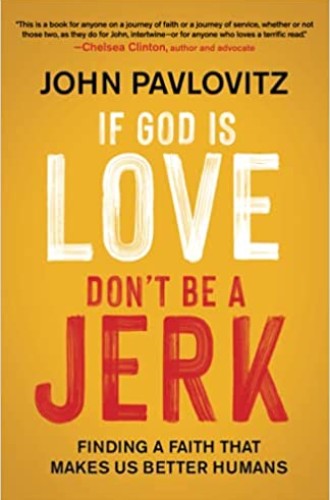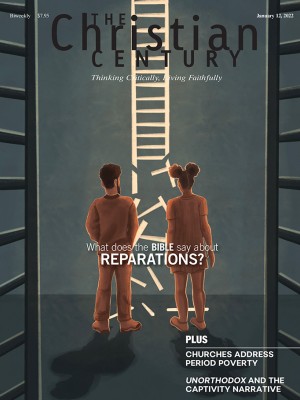John Pavlovitz’s bottom line: Faith should be a life of love
The popular blogger speaks to the pain of Christians who are disappointed with the failures of the church.
If you follow religious commentary online, it’s hard to ignore John Pavlovitz. His blog, Stuff That Needs to Be Said, recently surpassed 100 million total page views. In 2013, a year after launching the blog, Pavlovitz was fired from his church for his “provocative” articles. He remains provocative today. “The steady stream of vitriol I receive from professed Christians who identify as MAGA or QAnon or Republican is completely understandable,” he wrote in a November 5 post. “They’re coming face to face with the sobering reality that they are antithetical to Jesus.”
Pavlovitz describes himself as “a theological mutt.” He summarizes his spiritual journey as a “five-decade pilgrimage . . . from obedient Catholic altar boy to disenchanted teen to hopeful agnostic to defiant atheist to overconfident United Methodist megachurch pastor to deconstructing progressive to humanist Christian to whoever and whatever I am today.”
Read our latest issue or browse back issues.
I’ve appreciated Pavlovitz’s blog posts in recent years, especially his searing and fearless critique of Donald Trump and the evangelicals who love, support, and seemingly worship him. I also enjoyed his previous book, A Bigger Table: Building Messy, Authentic, and Hopeful Spiritual Community. Still, when I first heard about If God Is Love, Don’t Be a Jerk, I wasn’t inclined to read it. The title felt contrived and superficial.
I eventually relented and read the book. I’m glad I did, because it’s anything but superficial. It reads something like “the Gospel according to John Pavlovitz,” providing insightful and engaging reflections on some of the most important faith issues of the 21st century.
Pavlovitz discarded simplistic religious certainty a long time ago. “Some days it’s difficult to know what I believe about God anymore,” he writes. “I’m perfectly comfortable hovering somewhere between orthodoxy and heresy. . . . If there’s any constant in the search for God, it should be marked by unsettledness, like trying to wrap your arms around fog.” He finds comfort in his embrace of ambiguity by appealing to the language of Matthew 7, where he describes himself as “an asker with more questions, a seeker still looking, a knocker approaching new doors.”
Like many of us, Pavlovitz has grown increasingly disillusioned with institutional religion. “Organized religion has been an exercise in diminishing returns,” he writes. In his opening chapter he speaks about outgrowing the “God box” which is too small, constricted, and outdated. He writes, “I’m not necessarily telling you to abandon your faith tradition or that it’s unhealthy for you—but I am telling you that your faith tradition is ultimately incomplete.” Pavlovitz recognizes that this process can be painful for some. “When you begin to unbox God, you may find yourself uncomfortable in church or religion because these places begin to feel restrictive to your soul. . . . That’s when you discover that God has left the building and that maybe you need to as well.”
Pavlovitz’s strongest critique of institutional religion is directed toward the evangelical church, which, in his opinion, has become toxic beyond repair. “I can’t align myself with the human rights violations and overt racism and rabid nationalism that is defining Christianity in America. If being a Christian now means such things—count me out.” He laments that the evangelical church features “homophobic politicians and Muslim-hating celebrity evangelists and perpetually oppressed seasonal Christmas warriors: with gun-toting preachers and damnation-wielding social media trolls and predatory presidents. . . . This monstrosity claiming to be of Jesus would be unrecognizable to him.” Although Pavlovitz occasionally acknowledges that alternatives to toxic evangelicalism exist, he usually conflates it with American Christianity in general—which will feel to many readers like an unfair assertion.
Pavlovitz’s bottom line is that faith should result in a life of love. That thesis is reflected in the book’s subtitle, which suggests that authentic faith will make people into better humans. He summarizes his core message by saying, “the single conclusion I’ve come to as a result of all my study and prayer and wrestling and preaching, the sole fixed truth I can hold on to, is that faith shouldn’t make you a jerk. That’s it. . . . your theology is only valid to the degree that your life is loving.” The book’s final sentence is a plea: “For God’s sake and for the sake of hurting, exhausted, scared human beings around us, if we accomplish only one thing with our remaining days, let’s love one another.”
The book also includes Pavlovitz’s take on many other topics—including homosexuality, abortion, scripture, hell, providence, prayer, holy anger, Christian nationalism, and a gender-fluid God. I would have been interested in hearing Pavlovitz’s thoughts on some of the thorny theological questions readers of my website often grapple with: Is God personal? Does God intervene in the world? Was Jesus divine? Should I remain in church if I no longer believe, especially if I work at one? But no book can deal with everything, and this volume doesn’t pretend to be a systematic theology.
I would also have preferred fewer critiques of toxic faith and more prescriptions for making the church healthier, both for those who choose to remain in it and for the world that it helps shape. Still, If God Is Love, Don’t Be a Jerk is well worth reading. Since Pavlovitz’s primary audience isn’t the academy or the professional clergy guild but rather ordinary people trying to make sense of their faith during challenging times, perhaps his title is spot on. If today’s believers (and skeptics) could refrain from being jerks, the world would be a far better place indeed.






